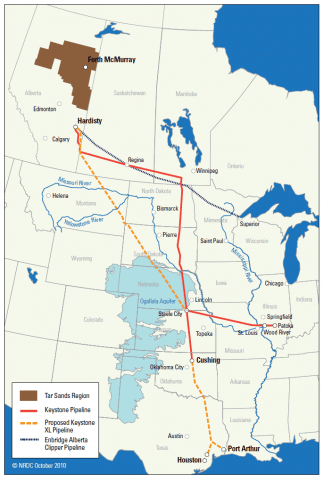A new policy adopted by the US National Farmers Union slams the proposed Keystone XL pipeline that would pump bitumen from the Athabasca tar sands in Alberta thousands of miles across America’s farm belt to Gulf Coast refineries in Texas. The Nebraska Farmers Union notes:
“The proposed route of the 1,980-mile pipeline would slice through Montana, South Dakota, Nebraska, Kansas, Oklahoma and Texas. It would cross the Ogallala Aquifer in Nebraska – source of 30 percent of the nation’s agricultural water and drinking water for millions – with a pipeline carrying diluted bitumen, a thick, heavy, corrosive and toxic form of crude oil associated with pipeline ruptures at 16 times the rate of conventional crude.”
Aside from concerns over the inevitable leaks and other environmental costs, many farmers along the proposed route are also incensed at heavy-handed pressure from TransCanada to surrender land against their will under “eminent domain” (expropriation) in order to create a right of way for the pipeline. This, argue the Nebraska Farmers Union and the farmers involved, is illegal. Since TransCanada is a Canadian corporation it should have no right to forcibly take land from US farmers.
“Midwestern landowners have felt they have been misled by a multi-national oil company that is planning to build a pipeline at all costs,” said Graham Christensen, public affairs director for the Nebraska Farmers Union.
The farmers are joined in their opposition to the proposed pipeline by 25 mayors of US cities who, meeting in Washington last week, sent a joint letter expressing concern over the pipeline to Secretary of State Hillary Clinton. The pipeline, they say, would directly undermine the hard work municipal leaders are doing to build a clean energy future for their communities. From the letter:
“Increasing our dependence on environmentally destructive, high-carbon fuels such as tar sands oil sends the wrong message to our communities and citizens who work hard to lessen our dependence on oil, using innovative conservation, efficiency and other measures. We remain committed to creating solid and lasting energy and economic security, and believe this is best accomplished by lessening our dependence on oil.”
So if Keystone XL is bad for farms and bad for cities, and the Texans definitely don’t want it, who is it supposed to be good for?
Keystone XL pipeline map courtesy of NRDC.
Subscribe to our newsletter
Stay up to date with DeSmog news and alerts






